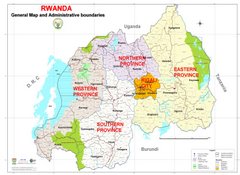Emmanuel MUNGWARAKARAMA
To have an adequate appreciation of the far-reaching effects of disparities between women and men, we have to recognize the basic fact that gender inequality is not one affliction, but many, with varying impact on the lives of women and men, and of girls and boys. There are no good reasons to abandon the understanding that the impact of women's empowerment in enhancing the voice and influence of women does help to reduce gender inequality of many different kinds, and can also reduce the indirect
penalties that men suffer from the subjugation of women.
Gender is a fundamental part of our daily lives. It is critical to our sense of self-identity and a pervasive part of our dealings with others. The first thing we want to know about a newly born human (even before we ask whether it is healthy and whole) is whether it is a boy or a girl, and we find it virtually impossible to interact with others until we have first identified their gender category. But gender is much more than just a personal
characteristic of individuals.
Rwanda has made significant achievements in terms of women's rights in its Constitution and laws. The Law on nationality now gives Rwandan women the right to acquire citizenship rights for their children. Moreover, a law on gender-based violence is expected shortly. At 48.8%, Rwanda has the highest number of women parliamentarians in the world.
But Rwandans should not be complacent about the situation.
Even though gender is an important issue to consider while appointing and giving opportunities in our society, competence should also be considered. The fact of being a woman/girl should not be the only factor in who occupies the post.
The empowerment of women should go parallel with capacity building, mobilization, sensitization of the entire society: so that men and women can get a clear picture on gender balance.
Gender balance and positive discrimination doesn't mean a shortcut to overthrow the political and local government positions. It must spread the sparks in all sectors – transport, business, the private sector in general – if the policy makers are conscious of woman empowerment.
Therefore, much remains to be done in achieving gender equity in the country, particularly for the rural majority and forgotten field of work.
The owner of this agrees with Dr. Herman Musahara, Dean of Faculty of Economics at the National University of Rwanda when said that, "reduction of gender based inequalities would increase economic growth hence reduction of poverty".
Sunday, February 25, 2007
Subscribe to:
Post Comments (Atom)
Rwanda

Administrative map
Blog Archive
-
►
2010
(59)
- ► 09/19 - 09/26 (1)
- ► 07/11 - 07/18 (5)
- ► 07/04 - 07/11 (5)
- ► 06/27 - 07/04 (4)
- ► 06/20 - 06/27 (6)
- ► 06/06 - 06/13 (17)
- ► 05/30 - 06/06 (4)
- ► 03/28 - 04/04 (2)
- ► 02/28 - 03/07 (3)
- ► 02/21 - 02/28 (5)
- ► 01/24 - 01/31 (2)
- ► 01/17 - 01/24 (4)
- ► 01/10 - 01/17 (1)
-
►
2009
(25)
- ► 11/08 - 11/15 (9)
- ► 10/04 - 10/11 (2)
- ► 01/25 - 02/01 (2)
- ► 01/18 - 01/25 (12)
-
►
2008
(55)
- ► 12/28 - 01/04 (1)
- ► 12/21 - 12/28 (11)
- ► 12/14 - 12/21 (3)
- ► 12/07 - 12/14 (5)
- ► 11/30 - 12/07 (2)
- ► 11/16 - 11/23 (22)
- ► 11/09 - 11/16 (4)
- ► 07/13 - 07/20 (1)
- ► 06/01 - 06/08 (6)
-
▼
2007
(19)
- ► 05/20 - 05/27 (2)
- ► 04/01 - 04/08 (1)
- ► 03/04 - 03/11 (1)
- ▼ 02/25 - 03/04 (2)
- ► 02/18 - 02/25 (2)
- ► 02/11 - 02/18 (6)
- ► 02/04 - 02/11 (3)
- ► 01/28 - 02/04 (2)
-
►
2006
(59)
- ► 10/22 - 10/29 (12)
- ► 10/15 - 10/22 (1)
- ► 10/08 - 10/15 (2)
- ► 09/03 - 09/10 (2)
- ► 08/27 - 09/03 (6)
- ► 07/09 - 07/16 (7)
- ► 06/18 - 06/25 (1)
- ► 04/09 - 04/16 (5)
- ► 04/02 - 04/09 (23)
No comments:
Post a Comment